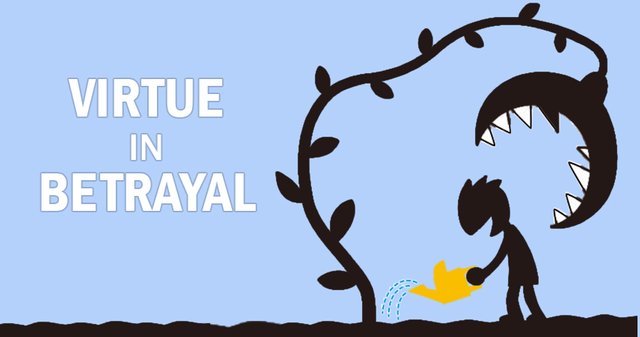Betray Someone
Someone may feel you have betrayed them. Did you do or fail to do something? It is not so difficult to renege on a personal undertaking. We also betray a fellow worker if we take credit for their work. Or if we fail to stick up for them when someone unfairly criticises them behind their back. I could betray a friend's trust if I were to gossip about an embarrassing personal matter he or she confided in me.
Author, John Gottman's What Makes Love Last? describes betrayal as at the heart of every failing sexual relationship, even if the couple is unaware of it. The obvious betrayal is sexual infidelity. Other types of betrayal include, telling lies, being unfair, and showing disrespect.
Betraying an important idea
Betraying a person is a familiar theme in works of fiction. There is also the betrayal of an idea. How many of us have actually remained steadfastly loyal to an inspiration we highly value - perhaps a political ideal, an ethical principle or a sense of vocation? Like me, have you ever sold out on an important commitment? Not kept faith with your guiding light?
There are those people who sacrifice much for the sake of working in line with professional ethics such as duty of care, or campaigning for social justice, or the improvement of the environment. Those of us not committed to a social or political cause, would probably be puzzled by the sense of shame and guilt experienced by some who feel they have failed in their mission. Who have not lived up to the ideals which had given them meaning and purpose in life. Who feel their actions have betrayed an all important principle.
These are not feelings that can be easily argued away. This kind of conscience is more than social learning or fear of what others might think. It is a matter of deeper awareness.
Betraying love
If we were to betray the trust of someone who doesn't matter to us then perhaps we would not feel inwardly too bad about it. Of course it might have some outward adverse consequences such as losing any advantages the relationship serves us or perhaps harming our social reputation. However, how horrible it must be to let down someone we cherish - our parents, children, or loving partner. We fear to do anything which displeases them. Or behave in any way that injures our loving relationship.
Betrayal by the religiously inclined
One might consider a religious person's guilty feelings as due to backsliding or falling short their ideal principles. However, I would suggest that for many it can be more about badly letting down someone who is loved. This for them is the sacred spirit whose personal presence they had sensed deeply in their soul. In other words, by failing to restrain their appetites or control selfish impulses, they seem to themselves to have created a subjective barrier with a divine ally and supporter.
They were conscious of one to whom they prayed person to person. From their perspective, it is their Lord with whom they confided their secrets, and who gave them consolation and encouragement. How terrible then it must feel to betray a deep commitment, letting down one's best, albeit invisible friend.
Christian existentialists such as Søren Kierkegaard recognise the need for a life of real repentance, for a realistic analysis of one's motives and actions, and an open and honest facing and struggle against all the disintegrating forces in oneself.
Response to those who betray
HURT
Julie Fitness, a psychologist has studied and written about the impact of betrayal in relationships. If you are depended on for concern and support and you betray this trust, then this is like a stab at the heart that leaves the other person feeling unsafe, diminished, and alone.
ANGER
Most of us haven't exposed our country to danger by treacherously giving information to an enemy. But in Great Britain traitors have in the past been hung, drawn and quartered. A most atrocious death for anyone to experience, revealing the anger expressed by society when responding to betrayal.
Writer F Diane Barth interviewed numerous women who described feeling betrayed by friends who could not tolerate or support them through an illness, or a divorce, or the loss of a spouse or child. Hurt can turn into anger which may prevent any renewal of the friendship. However, the angry response energises some people to tackle the individual in an honest exchange. Often this allowed a working through of the difficulty.
DENIAL
On the other hand, one may minimise or even deny the hurt and anger. According to Jennifer Freyd of the University of Oregon, perpetrators, and witnesses may display 'betrayal blindness' in order to preserve personal relationships, their relationships with institutions, and social systems upon which they depend.
Responding to an extreme betrayal
According to the Bible narrative, Christ showed no sign of resentment, when betrayed by Judas Iscariot, one of those he called his friends. This despite the terrible consequence of being unjustly condemned and cruelly treated by his enemies and then tortured to death on the cross.
The response of Jesus to betrayal was a calm acceptance. We know there was no denial of the betrayal because he actually had predicted it. The rest of us would probably have given in to the impulse to bitterly complain, to express a grievance, or give vent to outrage perhaps cursing the friend who has caused our demise.
Like other major set backs in life, betrayal is something we probably will need to live with at some point. Perhaps we need to remember the cost of failing to keep faith with those we love. Also we have very real choices in how we react when someone badly lets us down, who we thought we could trust.
As a clinical psychologist, Stephen Russell-Lacy has specialised in cognitive-behavioural psychotherapy, working for many years with adults suffering distress and disturbance.
Article Source: http://EzineArticles.com/10022333